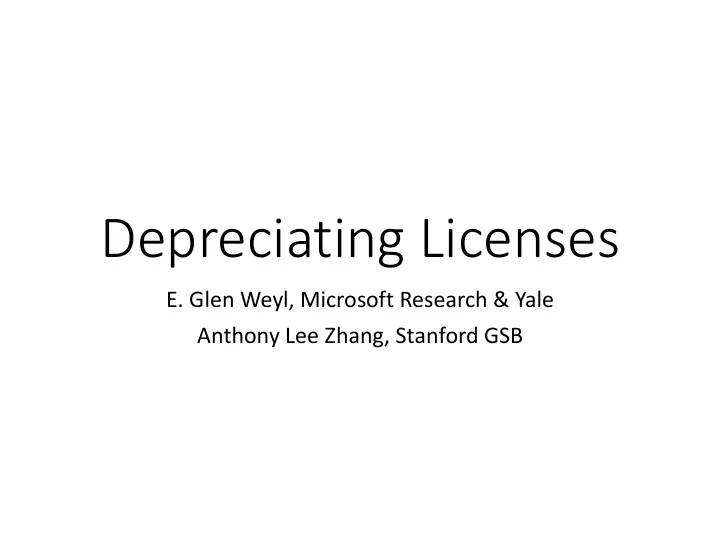

Depreciating Licenses E. Glen Weyl, Microsoft Research & Yale Anthony Lee Zhang, Stanford GSB
How do property rights affect market efficiency? • Economists are generally thought to favor strong property rights – “Coase theorem” often interpreted as saying that property rights traded in markets lead to efficient allocations • But Coase actually argued that, with transactions costs, property rights can inhibit efficient allocation • What are the economic tradeoffs from stronger and weaker property rights? How can we redesign property rights to improve asset allocation and use?
Strong property rights inhibit reallocation and lead to holdout, underuse and decay
Weak property rights create uncertainty and threaten investment security
Property right design should recognize this trade-off • Efficient reallocation: Looser property rights combat speculation and holdout, assigning assets to owners who value them most • Investment security: Stronger property rights give owners the security and confidence to make long-term investments in assets • Standard property rights systems trade off these objectives poorly: • Perpetual, unconditional ownership • Term-limited leases • Eminent domain • Can we design a better system?
Depreciating licenses (DLs) • DLs last forever, but “depreciate,” e.g. 10% a year. Each year, property owners announce prices to repurchase 10% of their licenses • Repurchase payment can be thought of as a self- assessed license fee • Price announcements are public, and anyone can buy property at owners’ announced prices • Since owners pay fees proportional to prices, they announce prices close to their true use values
Depreciating licenses (DLs) • DLs make holdout and squatting expensive because of self-assessed license fee, hence encourage efficient reallocation compared to perpetual ownership licenses • Buyers can acquire DLs only by paying owners’ self - assessed value, hence DLs encourage investment security compared to term-limit licenses and eminent domain • Reallocation can occur at any time, so DLs adapt to technology/market shifts without govt intervention • DLs are rule-based and decentralized, limiting the potential for govt abuse
Applications • Land and other publicly owned natural resources • DLs help resources be assigned and used efficiently • Revenue from selling DLs and self-assessed fees can be used for public services or redistributed
“Radical markets” agenda • Markets are a set of technologies bundled by historical coincidence: • Property rights • Price formation • Competition • We can design markets by modifying and recombining these technologies for different contexts • Depreciating licenses are a small step in this direction – much more left to do
Recommend
More recommend